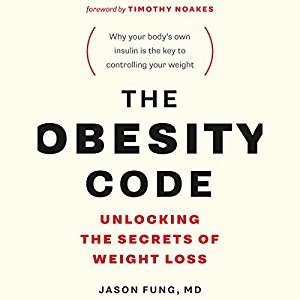The Obesity Code by Jason Fung

The Obesity Code: Unlocking the Secrets of Weight Loss
by Jason Fung
I was in two minds when picking up this book to read. First, I read a large number of health books per year so I’m up to speed with the approaches that are outlined in this book. Second, I am far from being obese, therefore I wasn’t sure whether I would get anything actionable out of the book. The reason I did pick this book up was due to reading Fung’s other book on intermittent fasting which I enjoyed.
From the onset, this book is worth the read. Fung introduces the various concepts of what makes up obesity and why we as a society are in an epidemic. He outlines the history and I liked the approach he took in explaining each concept, hormone and medical condition (backed up with facts, studies and experiments). A lot of books in this realm can sometimes be a little technical in detail however this one was easy to read.
The most important point brought out in this book is the difference between carbohydrates (incl. sugars) and calories. What’s quite fascinating is how the health industry has focused primarily on correlation and not causation. For example, Mississippi has the highest level of poverty in the USA yet also has the highest level of obesity? The correlation between diabetes and carbohydrates; not the cause which is insulin resistance. The biggest problem is that we look at correlation of obesity and associated diseases and take action by saying here is a pill to fix it.
The Obesity Code explains the background, history, current state of the health industry along with breaking down the complexities of how to fight back. Definitely worth a read for those interested in being healthier!
Three key takeaways from the book:
1. Insulin causes weight gain. I have never read it quite this way, however, this concept is continually emphasised throughout the book. Simply put, the more insulin your body produces the more likely you are to store fat. Or said differently again, obesity is a hormonal disorder not a caloric disorder.
2. The record in the longest fast was for 382 by a man who never suffered from low blood sugar levels. Quite remarkable!
3. A male marathon runner typically has between 5 – 11% body fat. The amount of fat is enough for the runner to survive for a month without eating.





